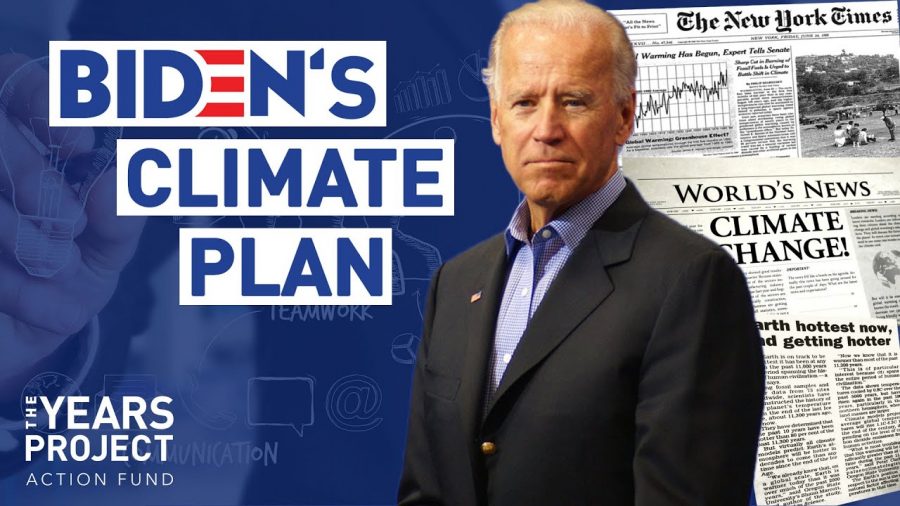The Biden Administration Plans for Ambitious Environmental Reform
This is an opinion article piece. Anushka Elavia is a student at Mendham who writes for Global and Domestic News. All opinions expressed in the following editorial are her own and do not necessarily reflect the views of The Patriot.
Democrat President-elect Joseph R. Biden Jr. campaigned on an ambitious agenda for climate change, proposing policies and regulations to foresee a shift to clean energy, carbon neutrality in the next thirty years, and expansive federal investments to drive these efforts. Biden, who has recently been declared the 46th president of the United States, plans to fulfill his promise of spending around $2 trillion over four years to reduce fossil fuel emissions and transition the nation to using clean energy. Unfortunately, former president, Donald J. Trump put forth no plans to address climate change and consistently undermined existing policies to reduce greenhouse gas emissions. Biden will, consequently, be faced with the responsibility to reverse the damage of those environmental rollbacks before continuing on with his objectives. Although the majority of the United States is in favor of acting upon climate change, the control of the Senate remains undecided, therefore if the Republican Party maintains control of the governing body, then much of the legislation needed to enforce the Biden Administration’s environmental plans would be constrained. Biden has pledged to tackle the expanding climate crisis in the United States and restore the nation’s credibility on sustaining the environment.
In terms of the Senate, there exists a 6-3 Republican majority on the Supreme Court, and there have been over 200 Republican federal judicial appointments over the past four years. This past Wednesday, Republicans held 50 seats in the Senate and Democrats held 48. To split the senate evenly, both Republican senators in Georgia have been forced into runoff races against Democrats that will determine the control of the Senate after a six-year Republican majority. If the Senate is split 50-50, Biden’s vice president, Kamala Harris, would be called upon to break the tied votes, giving the Democratic party an upper hand. If the Senate maintains its right-winged majority, Biden will need to use executive actions and federal agencies to implement a large sum of his policies, as this was the case under the presidency of Barack Obama. Furthermore, under a Supreme Court that has recently become more conservative with Amy Coney Barrett replacing the late Ruth Bader Ginsburg, Biden will indefinitely face legal challenges.
If Biden is officially elected president, then he will be the most enterprising candidate to act upon environmental reforms in United States history. In order to act aggressively and immediately on climate change, here are three major actions Joe Biden can take without a Democratic majority in Congress:
1) Reverse energy rollbacks
Before the Biden Administration is able to take progressive action on the climate, it must rebound from the environmental rollbacks put forth by the Trump Administration. Former President Donald J. Trump established no plan for climate change during his four-year term and consistently overlooked existing policies to limit greenhouse gas emissions. Trump weakened more than 100 environmental regulations, undermining the issues of air pollution and emissions, drilling and extraction, infrastructure and planning, animals, water pollution, and toxic substances and safety. “It’s not just flipping the dial and going from Trump back to Obama,” said Barry Rabe, a professor of public policy at the University of Michigan who studies environmental policy. “It could actually take much of an entire term in office to reverse that reversal.”

2) Rejoin the Paris Agreement
If elected president, Biden has promised to rejoin the Paris Agreement, an agreement within the United Nations Framework Convention on Climate Change, aimed to strengthen the global response to the threat of climate change through dealing with greenhouse-gas-emissions mitigation, adaptation, and finance. This would simply require the nation to submit a novel set of commitments to reduce emissions before the upcoming UN climate change conference in 2021, as well as compose proposals to slash climate change by midcentury, explains Kelly Sims Gallagher, a professor of energy and environmental policy at the Fletcher School at Tufts University. Because the United States is the largest emitter of greenhouse gases in the world and the wealthiest nation, the country has a great responsibility in international negotiations, and therefore, Biden will be able to engage in foreign climate change.
3) Cease new oil drilling on federal land
The president and his chosen Interior Secretary will maintain the authority to decide the type of energy development able to take place on land owned by the federal government. On this issue, Biden has confirmed he will not issue new leases for fracking on federal lands. Biden may issue an executive order directing the Interior Secretary to halt all oil and gas lease sales and permits, preventing additional wells from being drilled and in turn, allowing for a steady transition away from natural gas. Furthermore, the Biden Interior Department could implement requirements on oil companies operating on federal land, inclusive of a rule mandating the capture of methane emissions, a significant contributor to global warming, from wells and other infrastructure. The possibility also arises for Biden to reverse some of the leasing done under the Trump administration, which has auctioned off millions of acres of federal land. Although federal judges have occasionally intervened to suspend or invalidate hundreds of leases because of legal violations by the Interior Department, experts believe the Biden administration could go further by voiding leases that have been issued, but where the land has not been developed, or through repurchasing them.
The Biden Administration plans to fulfill a multitude of other goals, including, but not limited to: reducing greenhouse gas emissions from transportation through developing the existing Clean Air Act, using the federal government procurement system to work towards 100% clean energy and zero-emissions vehicles, and requiring public companies to disclose climate risks in their operations and supply chains. As the nation anticipates the condition of the environment over the next four years, the urgency to preserve, protect, and sustain the natural world is more prevalent than ever. If successfully executed, the policies and regulations of the Biden Administration will gradually navigate environmental security for the nation.

Anushka Elavia is currently a senior at West Morris Mendham High School - Class of 2023. In school, she is a Class Officer for Amnesty International/ UNICEF...











